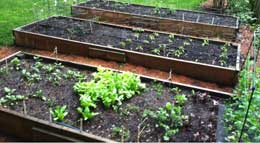I am a gardener. My kids got me started years ago with a few tomato and pepper plants in a small strip of ground; we have evolved to large raised beds that generate hundreds of pounds of produce annually.
Over time we have battled flooding (thus the raised beds), drought (we now have a watering system), overhanging trees (call an arborist), deer (higher fences), and invasive species (aggressive weeding!).
This year we have a new “menace” in a warren of rabbits living next door. Rabbits are magical creatures that can cause an entire bed of bean plants to disappear, POOF!
The installation of rabbit fencing got me noticing that gardening is a metaphor for life. I offer these for your reflection, action, or amusement as you dive deeply into summer.
- Start With What’s Easier. Tomatoes, beans, and herbs will grow for just about anyone, in any conditions. Later, you can graduate to fussier crops like broccoli, asparagus, and peas.
On the path to Happiness, begin with the basics like keeping a gratitude list, positive self-care, and smiling (which works for anybody). You’ll know when you’re ready to dive deeper.
- Protect Your Space. Squirrels, deer, rabbits, and birds will wreak havoc with your garden, so you must establish and maintain fences and boundaries that say, “you can’t go here.” Don’t get upset with them – they are just doing what they do naturally. You can’t make a rabbit not a rabbit; you can only manage where they operate.
If there are people in your life who eat away at your gains or work to undermine your happiness, you have choices. You can rail against the injustice of it, or you can accept that you can’t change them – but you CAN change you. Be very clear about your personal boundaries. Practice saying “No, you can’t go there.”
- Support What Needs Supporting. Trellises, stakes, and cages are important for your beans, peppers, and tomatoes to perform at their best.
You need support, too. Who are the people in your life who you can lean on? Remember that feeling connected – to friends, family, or community – is one of the foundations for happiness. You can also be the support for others who need it.
- Make Decisions and Let It Go. My wife’s least favorite part of gardening is thinning. It breaks her heart to intentionally pull up and kill those lovely little seedlings. But cull we must, in order that the surviving plants get the resources they need.
Life offers many choices for what to do and where to pay attention. I continually have a list of at least 100 great ideas that I want to implement. My marketing coach continually reminds me that a few strategies given full attention will yield far better outcomes than trying to do everything – and thus doing nothing well.
- Don’t Be Afraid to Try Something New. Each year we allocate space for an experimental crop. Corn? The raccoons got it first. Celery? Huge success, offering summer-long freshness. Peanuts? Grew well, but yield little return for the work. We’ve learned over time which crops work best in our space.
Try something outside your comfort zone to keep your edges sharp. Maybe it’s a new food, or visiting a church or festival in a different neighborhood, reading a book in a new genre, or adapting a new technology. Your body and your brain actually love the stimulus of new experiences. And if it doesn’t work for you? Remember that failure is also a form of learning!
- Accept That Some Things Are Beyond Your Control. Rain – or not. Sunshine and Clouds. Rabbits.
Nurture your personal sense of flexibility. Practice the art of “Yes, And…” by accepting whatever happens and turning your attention to “what’s next?” Arguing with reality is the source of most suffering; instead, accept what is happening and focus on what you can control – your attitude, your reaction, and what you do next.
- Pay Attention Daily. Tomatoes don’t just show up at your door in August. You must work the garden regularly. Gardening is much less a “chore” when you spend a few minutes each day on it, e.g. weeding, watering, fertilizing, or trimming.
If you want to experience more Positive Emotional moments in your life or work, you can’t ignore your emotional well-being a
nd then expect Joy and Happiness to show up in your darkest moment. Daily practice is the secret to building strong Happiness “muscles.” Just a few minutes of meditation or stopping three times a day to stand up tall, take a deep breath, and center yourself will build your capacity for Calm and strength the next time you’re stressed.
- Be Patient; Trust the Process. Some crops do all their work above ground – not so with potatoes, beets, and their kind. It drives my wife crazy that she can’t see how big things are – many prematurely picked root vegetables have landed on our table under the guise of “baby carrots.”
Trust your own growth process. Daily attention to positivity will create little changes, tiny shifts, and nearly invisible gains. Yet each tiny change is occurring on a bigger base, and under the surface your capacity is growing larger.
When you give your garden enough water and sunshine, strong fences, daily attention, and a lot of love, you are more likely to bring a generous harvest to your table.
In like manner, when you give YOURSELF adequate support, strong boundaries, daily attention, and lots of love, you are
more likely to bounce back when challenged, handle stress better, and harvest more Happiness, Joy, and Calm in your life.
Happy Gardening!


